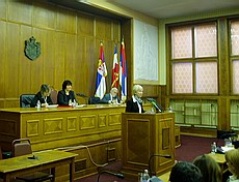National Assembly of the Republic of Serbia / Activities / Activity details

Tuesday, 19 October 2004
Working meeting to mark World Poverty Day
The Poverty Reduction Committee of the Serbian Assembly organised a working meeting with UN and UNICEF representatives in Serbia and Montenegro to mark World Poverty Day.
The Poverty Reduction Committee of the Serbian Assembly organised a working meeting with UN and UNICEF representatives in Serbia and Montenegro to mark World Poverty Day. In his opening address, the Chairman of the National Assembly, Predrag Markovic, underlined that, when considering new legislation, the parliament must keep in mind people endangered by the transition process, as well as those likely to be put at risk. “We must recognise the existing forms and consequences of poverty, as well as to what degree we can reduce poverty, in order to be not a richer, but a more normal society”, Markovic said. The meeting’s host, Snezana Stojanovic Plavsic, chairperson of the Poverty Reduction Committee, stressed the importance of co-operation between the parliament, the government, the civil sector and international organisations in intensifying the fight against poverty, and announced the formation of a committee which would deal with children’s issues as part of the parliamentary Poverty Reduction Committee. The government’s representative, Deputy Minister for Labour, Employment and Social Issues, Vesna Piperski Tucakov, presented the Social Innovations Fund, one of eight new projects aimed at reducing poverty among the segments of society most at risk. The government’s projects are assisted by the United Nations and the European Agency for Reconstruction.
In her first official address to legislators, the UN Resident Co-ordinator and UNDP Permanent Representative in Serbia and Montenegro, Ms Nicole Harrington, underlined that the UN wished to talk to all decision-makers authorised and able to create frameworks for implementing measures directed at reducing poverty. UN support in this field is aimed mainly at creating new employment opportunities, especially for young people, as well as at social protection. The parliament is a body which decides what proportion of the budget to allocate to poverty eradication through the implementation of the Serbian Government’s Poverty Reduction Strategy, Ms Harrington stressed, adding that the Strategy was one of the elements for the realisation of the Millennium Development Goals by 2015. She also added that the United Nations were able to offer information, as well as the right to choose from among the world’s most positive experiences.
“Realising the Millennium Development Goals assumes economic and political stability, but, above all, human development”, said Ann-Lis Svensson, UNICEF director for Serbia and Montenegro. She underlined that 30% of children in Serbia and Montenegro were living below the poverty line. “Children are the greatest victims of poverty, but at the same time the basic potential. Children are not an expense, but an investment, and investing in children means breaking the vicious circle of poverty”, Ms Svensson underlined.
The working meeting agreed to continue the practice of co-ordination and co-operation between the parliament, the government, the civil sector and international organisations in fighting poverty.

